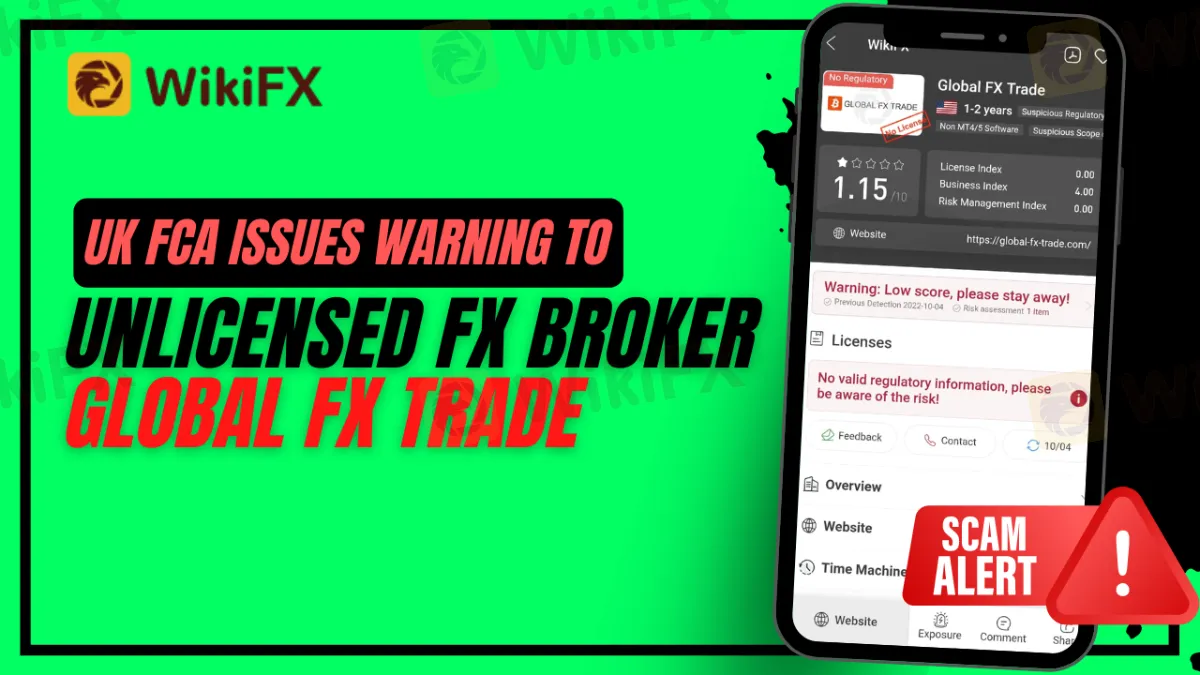简体中文
繁體中文
English
Pусский
日本語
ภาษาไทย
Tiếng Việt
Bahasa Indonesia
Español
हिन्दी
Filippiiniläinen
Français
Deutsch
Português
Türkçe
한국어
العربية
UK FCA Issues Warning to Unlicensed FX Broker Global FX Trade
Abstract:When a careless investor encounters a broker who claims to be licensed, it is easy to overlook the issue of regulation. Investors are particularly susceptible at this time since the regulatory information supplied by the fraudster may not be accessible on any Forex authority' websites. Global FX Trade is an example of a bold scammer.

When a reckless investor sees a broker claiming to be licensed, it's simple to dismiss the question of regulation. Investors are especially vulnerable at this time since the regulatory information claimed by the fraudster may not be available on the websites of any Forex authorities. This kind of scammer is a brazen fraudster, such as Global FX Trade.
Get Rich Quickly?
At first glance, the website (https://global-fx-trade.com/) shows a customer called Jonathan Larson who claims to have made $10,000 overnight by trading on Global FX Trade. He also seems to be pushing traders to “emulate his success.”

Non-MT4/MT5
Unlike other forex brokers, Global FX Trade solely supplies investors with a platform called FITS, rather than a third-party platform (MT4 or MT5). It is not a good option for the customer, particularly if they are dealing with an unregulated broker.
Scammers do not always utilize third-party platforms because they like to have complete control over the platform so they may tamper with market data and commit fraud.

Regulated? No!
Global FX Trade (also known as Global FX Trade Advisors Corporation) is a licensed broker under multiple regulations, including the United Kingdom Financial Conduct Authority (UK FCA), the Polish Financial Supervision Authority (PFSA or KNF), and the Capital Markets Board of Turkey, according to its website (CMB). Aside from that, it claims to be a registered investment adviser with the Securities and Exchange Commission (SEC).


We searched SEC but found no matching results. Furthermore, the National Futures Association, not the SEC, is the exclusive forex regulator in the United States (NFA). Nonetheless, there is no regulatory information on Global FX Trade in the NFA.


Samely, no results matched this broker in KNF or CMB.


Furthermore, the UK FCA has cautioned the public that Global FX Trade is an unlicensed broker.

Traders should always be careful in the volatile currency market. Check the Forex Broker's status first using the WikiFX App, as well as complaints from traders all around the world.
Keep a lookout for further Broker News.
Download the WikiFX App from the App Store or Google Play Store to stay up-to-date on the latest news while on the go.

Disclaimer:
The views in this article only represent the author's personal views, and do not constitute investment advice on this platform. This platform does not guarantee the accuracy, completeness and timeliness of the information in the article, and will not be liable for any loss caused by the use of or reliance on the information in the article.
Read more

INFINOX Partners with Acelerador Racing for Porsche Cup Brazil 2025
INFINOX has teamed up with Acelerador Racing, sponsoring an Acelerador Racing car in the Porsche Cup Brazil 2025. This partnership shows INFINOX’s strong support for motorsports, adding to its current sponsorship of the BWT Alpine F1 Team.

The Daily Habits of a Profitable Trader
Every professional trader follows a structured approach to ensure they are well-prepared, disciplined, and able to seize opportunities with confidence. Whether you are a seasoned investor or an aspiring trader, adhering to a robust daily checklist can significantly enhance your performance. Use this checklist to check if you are a qualified trader

The Impact of Interest Rate Decisions on the Forex Market
Interest rate changes determine currency attractiveness, influencing capital flows and exchange rate trends. Understanding this mechanism helps investors navigate the forex market effectively.

How a Housewife Lost RM288,235 in a Facebook Investment Scam
A 47-year-old housewife in Malaysia recently fell victim to an online investment scam, losing a substantial sum of RM288,235 after engaging with a fraudulent scheme advertised on Facebook.
WikiFX Broker
Latest News
TradingView Brings Live Market Charts to Telegram Users with New Mini App
Trump tariffs: How will India navigate a world on the brink of a trade war?
Interactive Brokers Launches Forecast Contracts in Canada for Market Predictions
Authorities Alert: MAS Impersonation Scam Hits Singapore
Stocks fall again as Trump tariff jitters continue
INFINOX Partners with Acelerador Racing for Porsche Cup Brazil 2025
Regulatory Failures Lead to $150,000 Fine for Thurston Springer
April Forex Trends: EUR/USD, GBP/USD, USD/JPY, AUD/USD, USD/CAD Insights
March Oil Production Declines: How Is the Market Reacting?
Georgia Man Charged in Danbury Kidnapping and Crypto Extortion Plot
Currency Calculator







